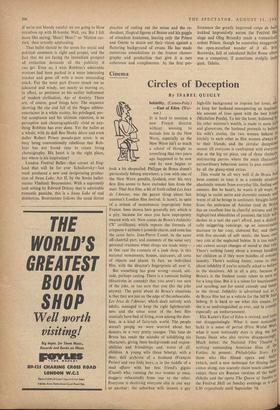Cinema
Circles of Deception
By ISABEL QUIGLY Infidelity. (Cameo-Poly.) —East of Eden. (War- ner.) IT is hard to mention a new French director without seeming to include him in the New Wave, especially as the New Wave isn't so much a school of thought as something that two years ago happened to be new and by now begins to look a bit shopsoiled. Philippe de Broca doesn't particularly belong anywhere; a row with one of the New Wave pundits, Godard, over his very first film seems to have excluded him from the start. That first film, a bit of froth called Les Jeux de !'Amour, was the gayest thing about last autumn's London film festival. It hasn't, in spite Of a stream of monotonous impropriety from France, been shown here generally yet; which is a pity, because for once you have impropriety treated with wit. Now comes de Broca's Infidelity ('X' certificate), which repeats the formula of crispness+ airiness +juvenile charm, and even has the same hero, Jean-Pierre Cassel, in the same off-cheerful part, and moments of the same very personal craziness when things are made witty— in that case the contents of a junk shop, in this national monuments, houses, staircases, all sorts of objects and places. In fact, an individual film, with the director's fingerprints all over it.
But something has gone wrong—mood, atti- tude, perhaps casting. There is a constant feeling (disastrous in comedy) that you aren't too sure of the joke, or too sure that you like the joke anyway. The point about de Broca's situations is that they are just on the edge of the unbearable. Les Jeux de l'Amour, which dealt entirely with adults, managed to keep the right lighthearted- ness and the sense some of the best film musicals have had of living, even among the dust- bins, in a kind of fairy-tale world. The people weren't peoplg we were worried about but dancers in a very' pretty masque. This time de Broca has made the mistake of solidifying his characters, giving them backgrounds and respon- sibilities and friendships and, worst of all, children. A young wife (Jean Seberg), with a dear, dull archivist of a husband (Francois Perier) and two little, boys, is in the middle of a mad affaire with her best friend's gigolo (Cassel) who, running the two women at once, staggers exhaustedly from one to the other. Everyone is deceiving everyone elte in one way or another : the suburban wife invents a gay high-life background to impress her lover, an to keep her husband unsuspecting an impious' ble amount of time spent with the best fried (Micheline Presle). To her the lover, bolstered b his other mistress's wealth, is made to seem ric and glamorous, the husband pretends to belicV his wife's stories, the two women behave as bitchily to each other as film women always do to their friends, and the circular deceptions mount till everyone is confronted with everyone else at the big set piece, one of those rhubarir, murmuring parties where the main characters extraordinary behaviour seems to pass unnotice by all the glassy-eyed extras. This would be all very well if de Broca bad been content to treat it as a comedy situation absolutely remote from everyday life, feeling and censure. But he hasn't, he wants it all ways, be brings in social satire and domestic comedy and worst of all he brings in sentiment. Straight he° from the embraces of Antoine (and de Broca has an excellent line in, cheerful sexiness and the highspirited abiurdities of passion), the little wife dashes in a taxi she can't afford, past a diaboli' tally sniggering concierge, up an interminable staircase to her cosy, cluttered flat; and there' with five seconds of soft music, she leans over two cots at the neglected babies. It is too much; - one cannot accept changes of mood at that rate' There's nothing funny about 'a woman handling her children as if they were bundles of overdue laundry. There's nothing funny, come to that, about infidelity if you're actually asked to believe in the deceivers. All in all a pity, because de Broca's is the freshest comic talent to turn LIP for a long time. But it is a talent for heartlessne55 and spoofing; not for social comedy and lurriPs in the throat. Infidelity is advertised not 35 a de Broca film but as a vehicle for the NEW Jean Seberg. It is hard to see what this means, Or she is as undistinguished as ever, and in comedy especially an embarrassment. Elia Kazan's East of Eden is revived, and turns out disappointingly. What it most noticeably lacks is a sense of period (First World War)' what it most noticeably does is plug the late James Dean who also revives disappointingly' Much better, the National Film Theatre Is the reviving outstanding American films of c Forties. At present: Philadelphia Story. t those who like filmed opera and ballet (which, until a new technique for filming thefil comes along, can scarcely claim much cinematic , value), there are Russian versions of the ballet Othello and the opera The Queen of Spades 3, the Festival Hall on Sunday evenings at 6 an 8.30 respectively until September 10.






























 Previous page
Previous page